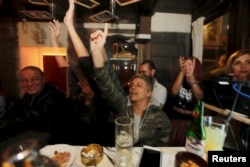By a military checkpoint in Damascus's Old City, just a mile from the battered frontline between government and rebel-held territory, young Syrians sit on a garden wall smoking, drinking beer or soft drinks, and talking about anything but the war.
It is a week night, but the Damascenes are keen to head out to a strip of new bars that have opened in the last few months — some to socialize and others to work in the venues.
The revival of activity in this once-vibrant quarter is part of efforts to project an air of normality in the Syrian capital, even as the five-year-old war that has killed more than 250,000 people and created 5 million refugees continues to rage nearby.
To the east and southwest, opposition-held Ghouta remains under blockade and bombardment by government forces. In Yarmouk Palestinian refugee camp, to the south, residents have recently faced starvation as rival jihadist groups al Qaeda and Islamic State battle for control.
Shells were hitting Damascus's city center late last year, including near Bab Sharqi gate. Now, people smoke water pipes outside Pub Sharqi — a play on words that reads the same in Arabic — or watch football at noisier bar "80's" next door.
"This is something you certainly wouldn't see two years ago, and it's picked up even more recently," said Nicolas Rahal, a 23-year-old graphic designer, speaking over loud music in a bar.
The number of people going out has grown as venues have opened one after the other and employed more people, Rahal said. "I can now go to this pub or that nightclub. Places opened and people came."
The war is still felt inside the capital. Soldiers carrying assault rifles sweep vehicles for bombs at army roadblocks, causing traffic jams throughout the city, while distant artillery fire can sometimes be heard.
Young people in the city are apprehensive about the future. They have lost loved ones to violence and displacement, rampant inflation is making life impossibly expensive, and some young men are anxious to avoid army enlistment.
But encouraged by improved security after Russia's intervention strengthened the government's position and a partial truce in February brought some calm, these Damascus residents want to enjoy life where possible.
"People are tired of war and just want to live a normal life, so they go out, they socialize," said bartender Dana Daqqaq, a 21-year-old with bleached-blonde hair who works at night while studying for her fine art degree.
"In the last few months it's not just at the weekends, it's every day. Places are crammed. You practically see a cross-section of society coming out."
'I stayed here'
Daqqaq said bar life was more than just a way to forget the war, but all the revelers had traumatic personal stories. "Family on my dad's side serving in the army were killed under siege in Homs," said Dana Ibrahim, 21, sitting at the same bar as Rahal. "My mom and four sisters live close to the military airport in Mezze."
The air base in western Damascus has come under shellfire and is next to the suburb of Daraya, which is besieged by the government side.
"At times there's been bombing every day. Once a rocket hit right next to the house. I was out of town and didn't hear any news for two days. I thought my family was hit," she said.
Ibrahim had thought of leaving, like many friends who have fled for Europe or neighboring countries. But now, able to socialize, she would rather stay put.
"When I started to see life I stayed here. I don't want to be a refugee," she said.
Rahal also wants to stay, despite his experiences of conflict. "More than once, near my house, I've seen people get blown apart by shells," he said.
He was arrested for protesting in 2011, near the start of the uprising that shifted into a full-scale civil war, and his political views have cost him friendships. Facebook arguments have turned into physical fights on the street, Rahal said.
"In the early days of the crisis, I had to hang out with other people. I know two brothers who don't talk to each other anymore."
Cost of living
One factor might push him to leave, however. "I haven't done military service. It could happen, I could get called up, and you've no idea where they'll send you or how long you'll be there. I have friends and relatives in the army, Aleppo, Palmyra, for example," Rahal said.
"If they call me up I'll leave the country. I could try and find work in Beirut."
Across the front-lines, young residents have even less choice.
Maher Abu Jaafar, a 23-year-old agricultural engineering student living in Western Ghouta, said escalating violence and a siege by government forces mean he cannot leave the town. "At the moment I work at a street stall selling household items. My family is big, we can't guarantee getting essential
supplies," he said via an Internet message. "And things are getting worse because of the cost of living."
Inflation has seen the Syrian pound lose 90 percent of its value since 2011.
In the Old City bar, Rahal tossed notes worth 550 Syrian pounds, or just over $1, onto the table.
"The situation has improved perhaps a bit for work, but the economic situation is bad. Things are expensive, living standards have fallen," he said.
At night, generators whirr outside homes, while blocks are plunged into darkness after perhaps half a day with electricity. Daqqaq, the bartender, said a packet of cheap cigarettes which cost 250 Syrian pounds a few months ago now costs 450. Tonight, though, she and her friends and customers are
preoccupied not with the war, the economy or thoughts of migration. They want to drink, listen to the Levantine-Western fusion of "Shamstep", and enjoy life.






